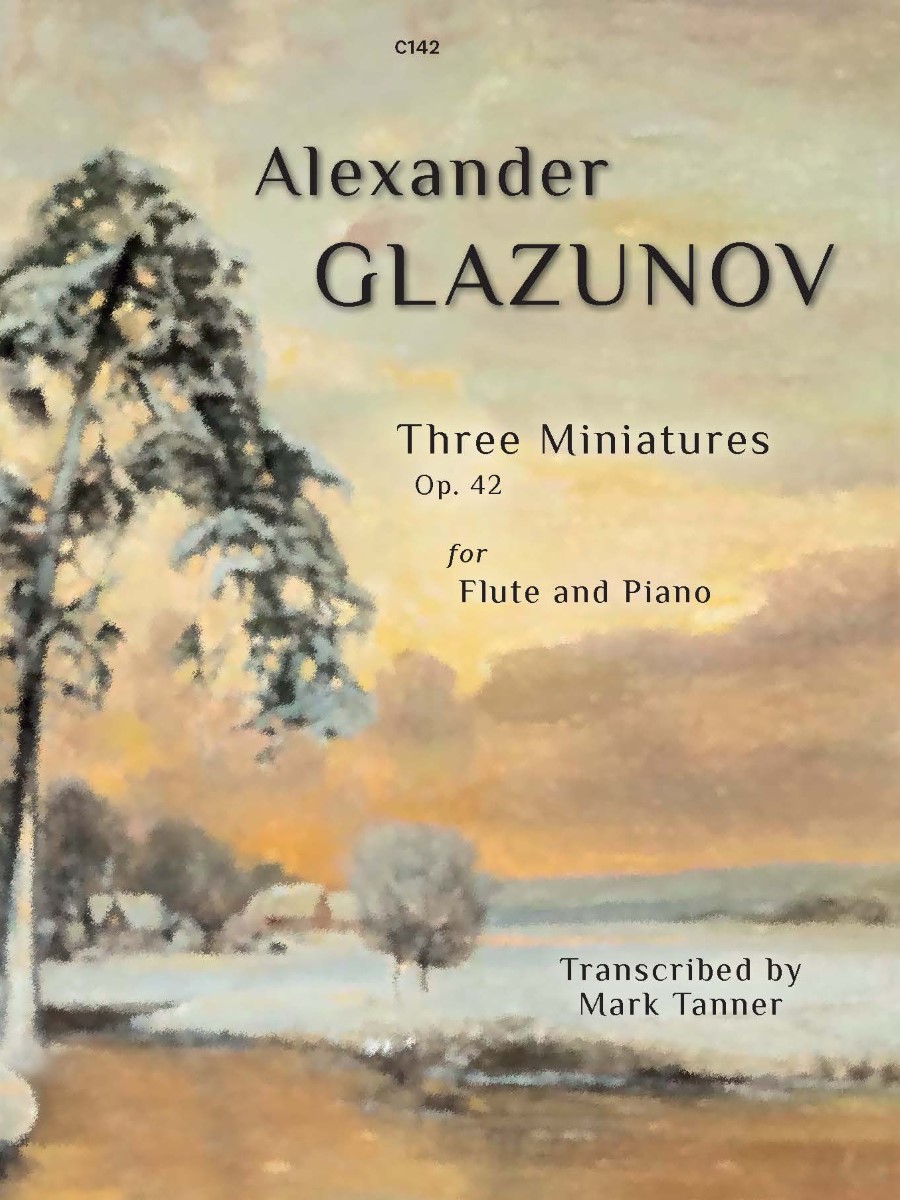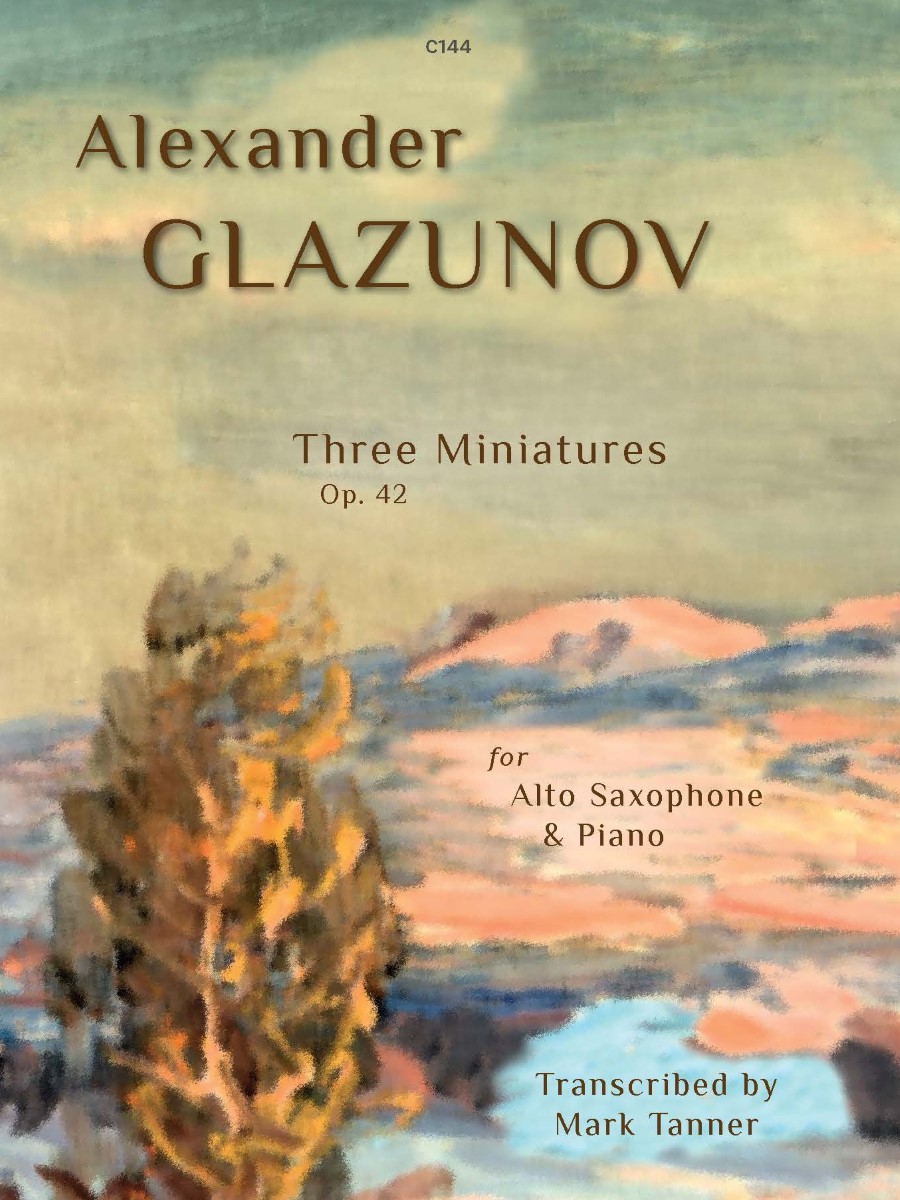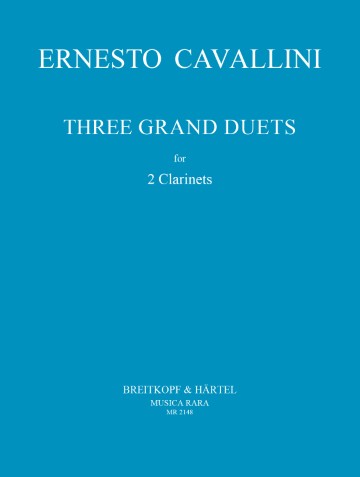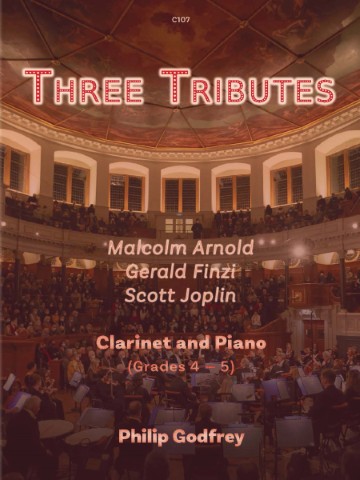Three Miniatures Op. 42 arr. Clarinet and Piano
Pastorale, Polka and Valse

Composer: Glazunov, Alexander
Arranger: Mark Tanner
Arranged for: Clarinet and Piano
Publisher:
| Product Code: | 979-0-570-81143-4 |
| ISMN: | 979-0-570-81143-4 |
| Publishers Number: | C143D |
| Series: | Glazunov Miniatures |
| Difficulty: | Grades 6 & 7 |
| Published date:: | 20230808 |
| Language: | English |
| Page count: | 32 |
| Condition: | New |
1. Pastorale
2. Polka
3. Valse
Trinity College Grade 7 Group A: Valse
Three Miniatures Op.42 was originally composed for piano by Alexander Konstantinovich Glazunov (1865-1936), who trained under Rimsky- Korsakov and became the most illustrious Russian composer…
Glazunov’s Three Miniatures, Op. 42, arranged here for clarinet and piano, were composed in 1893, are a charming set of short pieces that reflect the elegance and lyricism of the Romantic era. Each miniature captures a distinct character and mood, showcasing Glazunov’s gift for melody and his refined sense of form.
The first piece, Pastorale in D major, opens the set with a gentle, flowing rhythm that evokes the tranquility of the countryside. Its lilting 6/8 meter and delicate phrasing create a serene atmosphere, reminiscent of a peaceful pastoral scene. The harmonies are warm and understated, allowing the melodic line to sing with grace.
Next comes the Polka in B-flat major, a lively and spirited dance that contrasts sharply with the calm of the Pastorale. With its brisk tempo and playful syncopations, the Polka sparkles with wit and charm. Glazunov’s use of staccato articulation and rhythmic drive gives this piece a buoyant energy, making it a delightful interlude.
The final miniature, Valse in D major, brings the set to a graceful close. This waltz is elegant and flowing, with a sweeping melody that glides effortlessly over a lilting accompaniment. It captures the refined atmosphere of a ballroom, yet retains a sense of intimacy and poise. The Valse demonstrates Glazunov’s ability to blend classical structure with expressive nuance.
Together, these three miniatures form a cohesive and engaging suite that highlights Glazunov’s versatility as a composer. Though modest in scale, they offer a rich palette of moods and textures, making them a favorite among pianists and listeners alike. Whether performed individually or as a set, they provide a delightful glimpse into the charm and sophistication of late 19th-century Russian piano music.
Alexander Konstantinovich Glazunov (1865-1936) trained under Rimsky- Korsakov and became the most illustrious Russian composer and conductor immediately succeeding Tchaikovsky. Glazunov’s close affinity with the Saint Petersburg Conservatory, of which institution he would later become Director for more than two decades, placed him ideally to assist in the Institute’s transition to the Petrograd Conservatory in the immediate wake of the Bolshevik Revolution of 1917. For the last six years of his life, Glazunov left the USSR, feeling hemmed in by propagandist restrictions and at the same time out of kilter with the Modernist movement.
He lived in exile for a time, touring the USA, before eventually settling in Paris, though his stoical brand of Russian Romanticism never waned. Despite being partly remembered for having taught Shostakovich, Glazunov was never known as a revolutionary composer, more inclined to align himself with 19th century ideologies than with the thrusting new compositional paths forged by Prokofiev and others. Indeed, the nationalistic movement so successfully espoused by Balakirev found a new energy in Glazunov’s hands, and he discovered an opulence of scale which leaned more in the direction of Borodin.
There can be no doubting Glazunov’s technical mastery, which successfully drew together contrapuntal, lyrical and virtuosic skills, and which were admired by the likes of Liszt. Glazunov steered a steady course at a time when it was most sorely needed; one need only hear the marvellous Violin Concerto in A minor to experience the full power and authority of his writing, though he possessed an enviable touch with more intimate forms too, such as those readily to be heard in these three charming pieces.
Glazunov’s close affinity with the Saint Petersburg Conservatory, of which institution he would later become Director for more than two decades, placed him ideally to assist in the Institute’s transition to the Petrograd Conservatory in the immediate wake of the Bolshevik Revolution of 1917. For the last six years of his life, Glazunov left the USSR, feeling hemmed in by propagandist restrictions and at the same time out of kilter with the Modernist movement.
He lived in exile for a time, touring the USA, before eventually settling in Paris, though his stoical brand of Russian Romanticism never waned. Despite being partly remembered for having taught Shostakovich, Glazunov was never known as a revolutionary composer, more inclined to align himself with 19th century ideologies than with the thrusting new compositional paths forged by Prokofiev and others. Indeed, the nationalistic movement so successfully espoused by Balakirev found a new energy in Glazunov’s hands, and he discovered an opulence of scale which leaned more in the direction of Borodin.
There can be no doubting Glazunov’s technical mastery, which successfully drew together contrapuntal, lyrical and virtuosic skills, and which were admired by the likes of Liszt. Glazunov steered a steady course at a time when it was most sorely needed; one need only hear the marvellous Violin Concerto in A minor to experience the full power and authority of his writing, though he possessed an enviable touch with more intimate forms too, such as those readily to be heard in these three charming Miniatures Op.42, originally composed for piano.
Previously published by Spartan Press
Former catalogue number: SP1360
R.R.P 14.95
Our Price: 12.71
Digital Download – PDF
Shipping costs: No shipping
Other books in this series
You might also like
-
20 Crucial Clarinet Studies
£5.91 -
3 Grand Duets
£23.00 -
3 Romances Op. 94
£10.00 -
3 Tributes for Clarinet and Piano
£8.46






